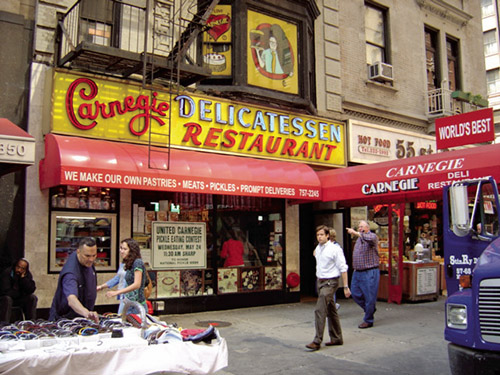
(Kosher Today) The news that Carnegie Deli, founded in 1937, would be closing by the end of the year represents yet another nail in the coffin of the once-coveted Jewish or kosher-style delicatessen, affectionately known as “the deli.” Many a tourist to New York made Carnegie, Katz’s or the 2nd Avenue Deli a must stop, particularly because of the overstuffed hot pastrami or corned beef sandwiches that always came along with an oversized pickle and a Dr. Brown’s soda. They were the remnants in a city that once had hundreds of delis in almost every neighborhood where Jews lived. Delis like Carnegie were known as kosher-style as opposed to the relatively few kosher delis that nowadays have reliable kosher certification. Experts say that these delis were referred to as Jewish delis because they were very much a part of the Jewish social experience, particularly in New York, and because they featured such well-known Jewish foods as gefilte fish, chopped liver, matzoh ball soup, knishes and stuffed cabbage.
The label kosher-style was meant to give some measure of assurance to Jews who still did not wish to eat pork. It told them that the food is in spirit kosher although not necessarily in substance. “The reason for the popularity of the deli is it was a gathering place for Jews, it was the gestalt of the experience,” said Ted Merwin, author of Pastrami on Rye: An Overstuffed History of the Jewish Deli in an interview with the media. “Delis became the secular version of the synagogue. The Irish had pubs, the African-Americans had the barbershop, and Jews had the delis. And in its way the pastrami sandwich became a symbol for the American dream.”
With the changing demographics in big cities like New York, Los Angeles, Chicago and Miami, many of these delis could have opted to become kosher certified and appeal to large numbers of Orthodox Jews but they refused to be stigmatized, couldn’t see being closed on Friday evenings and Shabbat, did not wish to pay the fees for a kosher certification and were not looking to attract yarmulkes out of fear that it would alienate their regular clients including large numbers of tourists. Kosher-style in New York is a fraction of what it was a half century ago as the kosher symbol has become more important to the growing number of Jews who observe kashruth. Around the country, many non-kosher establishments offer the Jewish foods but do not label them either Jewish or kosher-style. You can buy challah in many places but without kosher certification. Many rabbis have always been concerned about kosher-style out of fear that some innocent shoppers will mistake the food for kosher-certified products.













